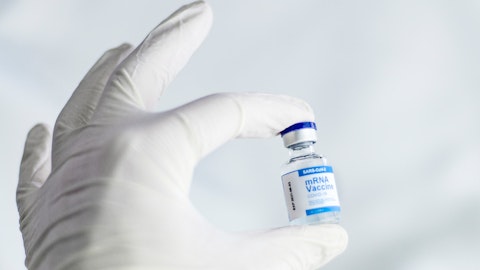Paul Hudson: Steve, excellent questions. That’ll be clear. I think — I’m going to try and choose my words carefully by remembering them. But back in December ’19, we said we’re out of the me-too late business. We did not want to be the fifth-to-market GLP-1 or the seventh to market SGLT2. It was consuming too much spend and would cost too much to commercialize and wouldn’t — delivered. You may not have followed the story, Multaq, for example. It’s a great little success story in cardiovascular and afib I think and has been — it shows you where we think there are niche populations where we trade somewhere between rare disease sort of levels, we think we can have some money, we still participate. You know — I think you know by now that we have a co-promotion deal with — on type 1 diabetes, which is much closer to immunology and rare in terms of patient profile.
So, I think what we declared was there’s huge big commercial deployments to be fifth to market. We’re not going to be our game anymore. But I think we have, as you point out, a brilliant set of experiences in both cardiovascular and diabetes. And I think if we thought that it stayed true to our ambitions, we’d be interested. I don’t know whether Olivier, you want to add anything?
Olivier Charmeil: No, I think you said it all. And I think in some way, what we have done with Rezurock, I think proves our ability in area of expertise that we are to win.
Paul Hudson: Yes. Thank you. And I think it’s — we’ve got expertise, but we’re not going to play that arms race in those other indications. But we’re well aware of our expertise. This is why companies are talking to us in those areas. But we will see. But immunology and rare, they’re amazing capabilities this company has. And so, sweet spot in and around that worked very well for us. John, BTKIs?
John Reed: Yes. I think one thing to remember is that Sanofi has by far the largest BTK program with well over 2,000 patients enrolled across four Phase 3 studies. So, we certainly have exposed far more patients than any of the other companies. And so, I’ll leave you to speculate whether it’s a matter of time and simply testing enough patients to adjudicate this issue. You’re all aware, of course, Biogen announced that they had some issues with their BTK inhibitor and were put on clinical — on a partial hold as well. So, let’s see what happens as more patients over more time, get treated with this class of agents.
Paul Hudson: Thanks, John. So, I think we — I don’t know, maybe add too much more, come back to where we were. We’re learning about this mechanism. And remember, the goal is to try and break new ground on efficacy, in particular, by crossing blood-brain barrier. It may become a risk benefit balanced conversation, often is in MS and other diseases. We think we can be very well placed on that. And John’s already answered, when we look left and right at the BTK landscape. Some excluded a lot of patients from their trial designs upfront and some are too early really to know. So let’s just be really clear that we are in — we’re navigating, and — we’re navigating in a narrow corridor but still weighted in our favor. Okay. Next question?
Operator: Yes. Next question, Matthew Weston from Credit Suisse.





